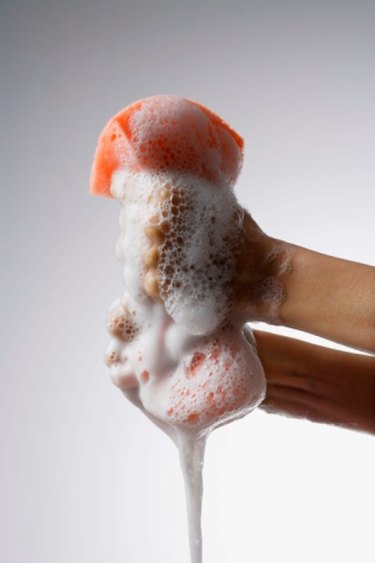
Although not generally a health concern, hard water interferes with many household tasks and can cause impeded flow or clogs in pipes, heaters and boilers, which can be extremely damaging. There are two types of hard water, each of which has a different cause and a treatment to convert "hard" water to "soft" water.
Hard Water
Video of the Day
Hard water is water that contains large amounts of dissolved ions. There are several ions that cause hard water, commonly bicarbonate, calcium and magnesium ions. Water hardness is measured by its concentration in parts per million or milligrams per liter. When the concentration is above 121mg/L, then water is considered hard, and using a softener is recommended to avoid damage to pipes caused by precipitating ions.
Video of the Day
Temporary Hard Water
Temporary hard water is water with an excess of bicarbonate ions, or HCO3 ¯. Bicarbonate ions are formed when carbon dioxide reacts with water to form carbonic acid, the same acid that is found in many carbonated beverages. When heated, this ion will break down into water and carbon dioxide, or H2O and CO2. To soften temporary hard water, boil the water. This releases the carbon into the air, thus removing it from the water.
Permanent Hard Water
Permanent hard water contains calcium, magnesium, iron and sulfate ions, but calcium and magnesium are more common. These ions cannot be removed by boiling; they must be removed from water chemically. A common way to do this is with the use of zeolites, plastic beads that are covered with sodium and potassium ions. These ions essentially switch places with the calcium and magnesium ions in hard water, thus removing them. However, this process puts large amounts of salt into the water and the zeolites must be replaced regularly.
Soft Water
Soft water is water that has had dissolved ions, with the exception of sodium ions, removed and has an ion concentration of 17mg/L or less. Rainwater is considered soft water; water becomes hard as it travels through the ground and absorbs minerals. Water that has been "softened," however, may have large amounts of sodium ions and may also be unsuitable or even dangerous to drink. Its appeal lies in that it is superior to hard water for cleaning, although hard water is considered the superior for drinking purposes.